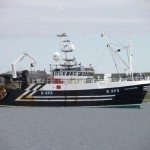

Crucial talks begin on fish catching opportunity for 2017

(Picture: Craig Taylor)
The negotiations are especially significant for the UK as this will be the first end-of-the-year EU Council meeting to decide upon annual quotas since the Brexit vote.
Many quota shares have already been finalised at the recent negotiations between the EU and Norway for shared stocks. This means that increases for North Sea cod and saithe (coley) are on the cards for next year, although the North Sea haddock quota is in line for a significant drop due to a readjustment that needs to be made to accommodate a previous error in the scientific assessment. A small 7% drop in North Sea herring is anticipated.
The European Fisheries Council will also decide upon a range of other stocks, including North Sea and West coast prawns (nephrops), and West coast haddock, herring and northern monkfish.
Next year will also see additional fish species brought into the phased introduction of the landing obligation regime (discard ban).
Mackerel, herring, haddock and prawns are already included in the regime, with whiting and cod being added for 2017. For those species included in the discard ban, additional quota top-ups will help fishermen meet the very real challenges it presents.
Bertie Armstrong, chief executive of the SFF said: “As ever, this year’s EU Fisheries Council will result in increases in some quotas and decreases in others, depending upon the scientific advice. For North Sea cod, the good news is that the recovery of this iconic stock is still continuing.
“A particular challenge for 2017 is that more species will come under the umbrella of the discard ban. Whilst no-one hates discarding fish more than our fishermen, this has the potential to cause real operational problems because of so-called ‘choke species’, where a mixed fishery has to close down in its entirety because the allocation of one species has been fully taken.
“This is just one of the reasons why our fishermen are so enthusiastically embracing Brexit. Regaining control of our 200-mile Exclusive Economic Zone will provide the twin advantages of fairer shares of catching opportunity for our fishermen, as well as better overall management. It means Scotland and the UK can at long last implement fit-for-purpose fisheries management plans, including a workable discards policy, that are good for fishing communities and good for the environment.”